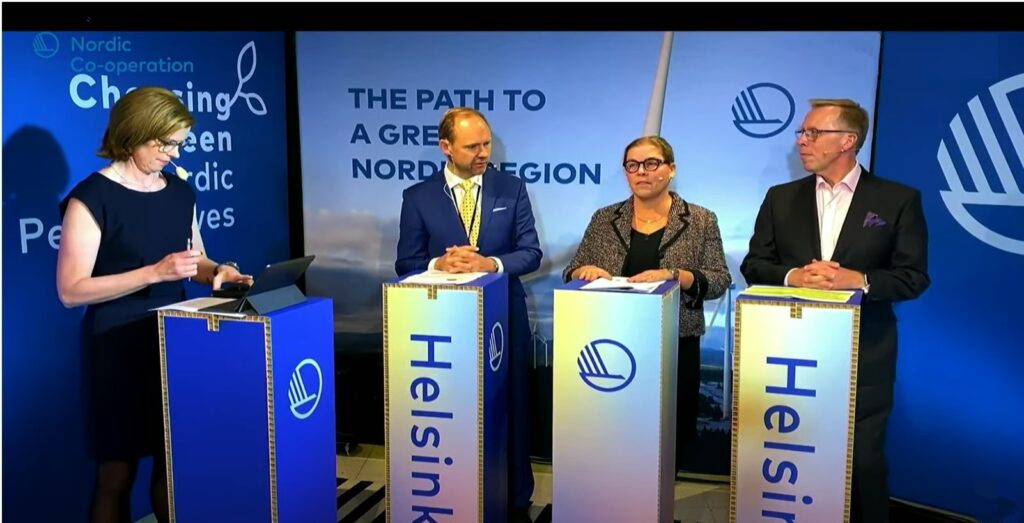15.12.2021 | News
Nefco organised a set of engaging COP26 side events that brought together key climate and green finance actors and demonstrated how Nordic solutions accelerate the global green transition.
Putting Paris Agreement market mechanisms into practice
The event Nordic approaches to support global carbon market cooperation brought together several organisations working on developing the carbon market mechanisms by supporting and initiating a range of piloting activities across the continents. The discussion focused on how the mechanisms in the Paris Agreement can be put into practice to support a global carbon market.
The Nordics are active in this field, and the Nefco-managed Nordic Initiative for Cooperative Approaches (NICA) initiative (financed by Finland, Norway, Sweden, the Nordic Council of Ministers and Nefco) strives to demonstrate, for example, how international partnerships can scale up and accelerate ambitious yet cost-effective climate action, promote sectoral approaches and sustainable development, and harness private sector finance and innovation.
As the rules for the mechanisms under Article 6 of the Paris Agreement were approved at COP26, it is now timely to look into this further. Article 6 provides a framework for international cooperation allowing international transfers of carbon credits between countries. It also establishes a central UN mechanism to trade credits from emissions reductions generated through projects.
The event was organised in collaboration with the Global Green Growth Institute (GGGI), the Ministry of Climate and Environment of Norway, the Swedish Energy Agency, the Eastern Africa Alliance, the Perspectives Climate Group, the UNEP DTU Partnership and WOCAN.
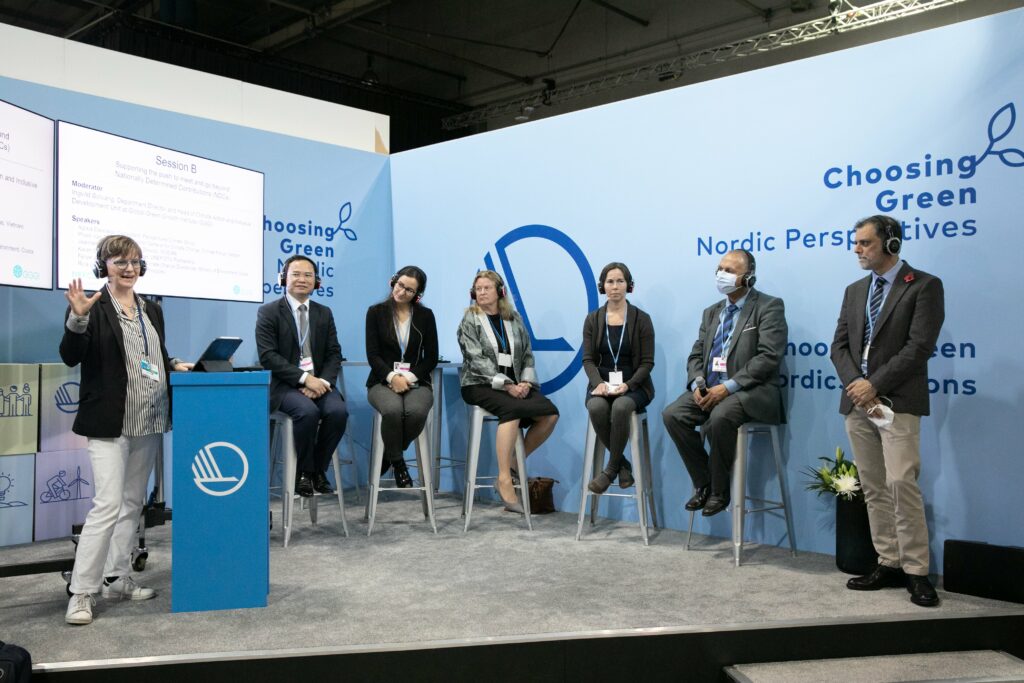
Supporting job creation and skills development in the off-grid sector
The Nordics are supporting job creation and skills development in the BGFA countries as part of their support to scale up the off-grid sector, which is becoming a significant employer in emerging economies that suffer from high rates of joblessness.
Both Denmark and Sweden, as donors to the BGFA programme, are financing a job creation sub-programme in Uganda, where the aim is to create at least 300 decent jobs within the off-grid solar energy sector in the country as well as to support different activities to pilot skills development. Currently, some 38% of the population in the country has access to electricity, of which 50% comes through the national grid and 50% through off-grid solutions.
The event The Nordics as pioneers in developing jobs and skills in Africa opened the current situation in Uganda and looked into overall job creation within the renewable energy sector.
At the event, Simon Trace, from Oxford Policy Management, highlighted that some 9,000-1,650 direct jobs need to be created in the off-grid sector in Uganda from now to 2030. These jobs are crucial for Uganda to electrify. Furthermore, he pointed out that support for training and skills development is needed to increase the female workforce in the sector, which is currently at about 30%, especially to get females into higher skilled jobs.
Kristina Skierka, CEO of Power for All, was optimistic about the development of jobs within the renewable energy sector but felt that the sector must actively reach out to young people to engage them to work in this sector. According to Skierka, over 23 million people have lost the opportunity to electrify so far during the COVID pandemic, but employment within the renewable energy sector is expected to pass the pre-COVID numbers already during 2022. Skierka also highlighted that the Beyond the Grid Fund is a forward-looking initiative that can really actualise the development of job creation in the off-grid sector with its results-based financing approach.
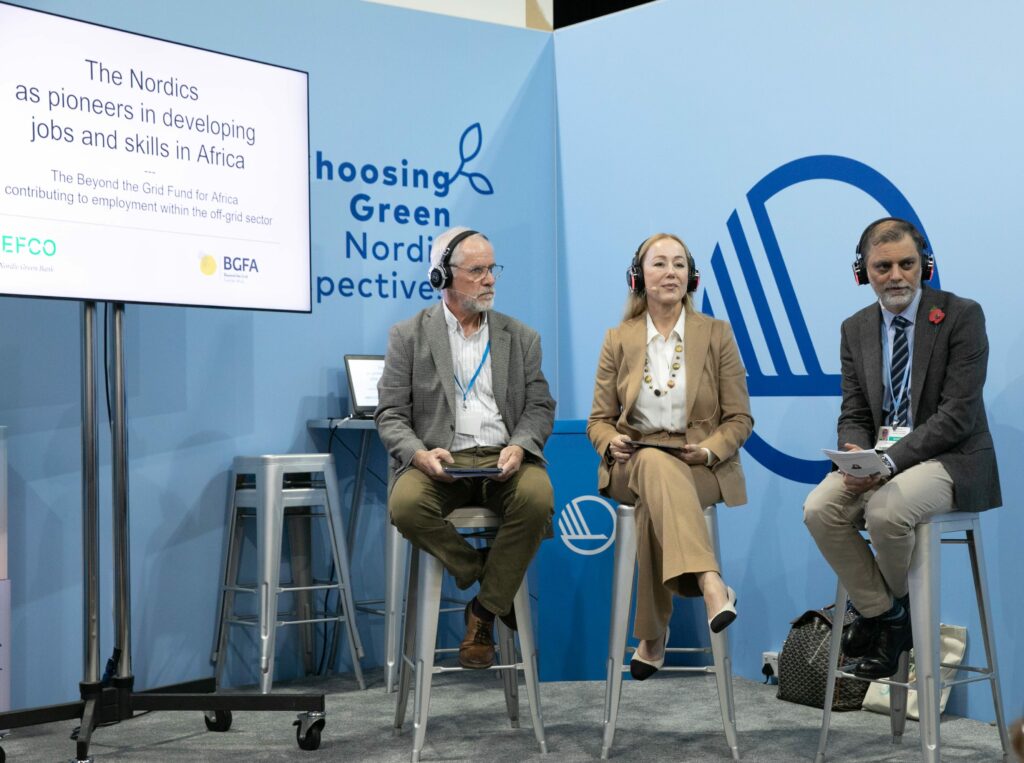
Scaling up energy access in Africa
During the official UNFCCC side event Mobilising private sector finance in Africa to achieve SDG7 outcomes, Per Olsson Fridh, former Minister for the International Development Cooperation of Sweden, commented in his opening remarks that a combination of national grid, off-grid solutions and mini-grids are needed to scale up energy access worldwide. Fridh highlighted that BGFA is a successful public/private partnership, as we need to work for a green transition together, “partnership is leadership”.
Over 700 million people still lack access to energy worldwide. “Off-grid solutions are the fastest and most cost-effective route to energy access,” commented Koen Peters, Executive Director at GOGLA, in his keynote speech. Some 420 million people already have access to electricity through off-grid solutions now. However, more public funding subsidies are needed to leverage private finance into the off-grid sector.
More financing is needed to scale up access to energy as well as strengthen the public-private partnership, which was also highlighted by Katarina Ammitzbøll, Member of the Danish Parliament. From its first funding round, BGFA has chosen energy service providers in Burkina Faso, Liberia and Zambia, and these funded projects will start their implementation during 2022.
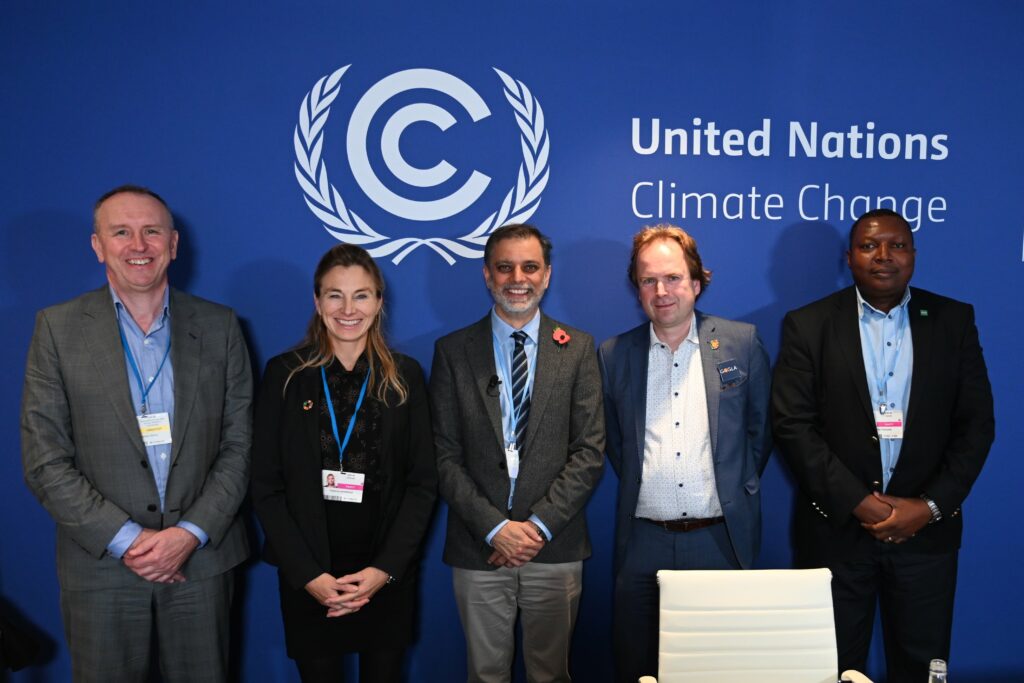
The effects of the EU Taxonomy on SMEs
Nefco’s event Demystifying the EU Taxonomy for Nordic SMEs tackled the upcoming EU regulation with the help of sustainable investing experts from Danske Bank, Gaia Consulting, Navigo Consulting and Nefco. The event, which was organised in cooperation with Green by Iceland and Business Sweden, took a practical approach to what the EU Taxonomy means for small and medium-sized companies and how the taxonomy mindset could be integrated into company operations. Nefco’s Investment Manager Søren Berg Rasmussen concluded that even though the regulation does not apply to SMEs directly, there are some likely indirect effects through value chains and investors. Large and listed companies as well as financiers must start reporting on their taxonomy alignment from January 2022 onwards, which may lead to information requirements for their suppliers and clients.
Three Nordic companies, namely Sensible4 from Finland, Thor Ice Chilling Solutions from Iceland and NOAQ Flood Protection from Sweden, participated in the discussion by showcasing their companies’ green solutions and sharing their perspective on the EU Taxonomy. During workshop it was brought up that only a small number of economic activities are currently listed in the EU taxonomy regulations. However, it can be a valuable exercise for the companies to see if their economic activities are taxonomy relevant and familiarise themselves with the screening criteria with the help of, for example, the EU Taxonomy Compass. If a company is aware of the Taxonomy criteria and can provide insight on their environmental impact, it may help with accessing finance and collaborating with larger companies.
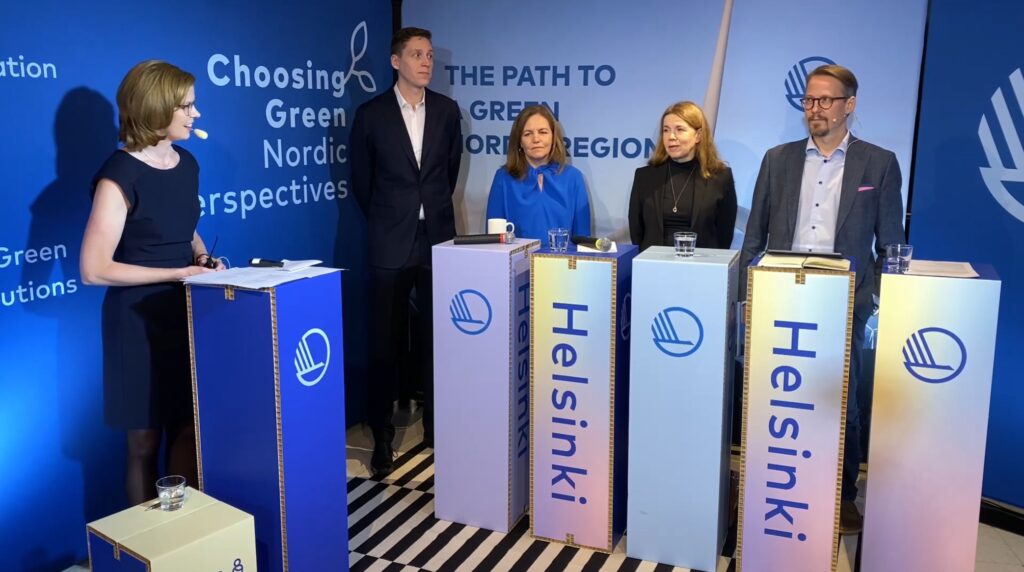
Nordic green financing models in action
The event Towards a more liveable planet co-hosted by Nefco, Nordic Investment Bank (NIB) and Nordic Development Fund (NDF), the CEOs of the three Nordic international financial institutions got together to discuss how the Nordics are addressing climate change and how each institution contributes to building sustainable and competitive economies under their respective mandates.
In her opening speech, Finnish Minister of Environment and Climate Change Krista Mikkonen summarised the status of climate negotiations and shared her perspective on the Nordic contribution to the climate summit. “The role of Nordic international financial institutions is very important, not only for impact in our region, but also outside the Nordics,” Mikkonen highlighted.
During the panel discussion the CEOs of Nefco, NIB and NDF showcased concrete climate solutions. The three institutions have different mandates and roles in the green transition and mobilising climate finance. “We will not go from millions to trillions in climate finance without engaging the private sector,” said Karin Isaksson, Managing Director, NDF. Nefco’s Managing Director Trond Moe also pointed out that Nefco’s role as a green international financial institution is to try out different concepts that combine public and private financing and accelerate the green transition in the finance sector. “We need to show that taking risks for green can profitable. We want to transform finance in such way that eventually all finance would be green,” Moe said. André Küüsvek, President and CEO of NIB reminded of the ambition voiced in Glasgow the previous week while sharing NIB’s commitment to sustainable financing: “Between 2021 and 2030, we will finance projects in amount of EUR 30 billion with specific environmental benefits according to our mandate, sustainability and ESG criteria.”
